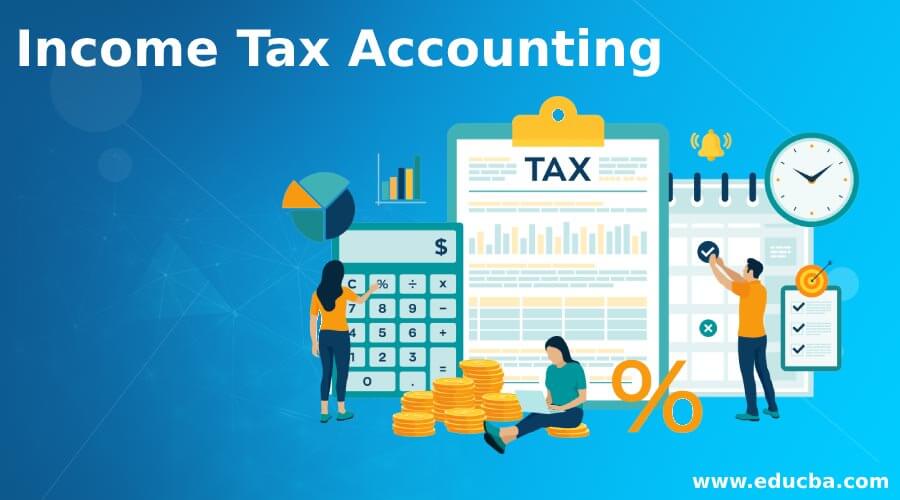Updated July 19, 2023
Definition of Income Tax Accounting
Income tax accounting is the branch of accounting that involves determining tax liability on income. Accounting which is undertaken to determine tax liability, differs from the accounting used to report income, assets, and liabilities on the balance sheet.
It also involves determining current taxes, deferred tax, tax liability, and tax paid. income tax accounting applies to all categories, whether it is business, individual, company, or other business forms.
Explanation
It is based on the premise that all income and expenses which are liable for taxation should be accounted for, unlike financial accounting, which involves that business transaction as well, which doesn’t have tax consequences. Further, income tax accounting procedure varies for individuals based on their income slab, corporations based on their legal form, etc.
The determination of income tax expenses is based on financial statements and typically differs from the computation of income tax expenses according to the relevant income tax act applicable to the business entity. This results in separate two-way calculations, which report different tax liabilities for financial reporting and recognize different values for the actual tax purpose.
Objectives of Income Tax Accounting
There are multiple objectives, and businesses must follow that to attain their objectives. Objectives are enumerated below:
- It helps in determining the appropriate capital structure for the business. a mix of debt and equity constitutes the capital structure for the business, and both have different tax complications on the business, which ultimately impact the business decision.
- It helps businesses and individuals determine their actual tax liability and ensure the payment is made on time to avoid tax penalties and, at the same time, avoid early payments as there is a time cost attached to money.
- It enables various entities and individuals to claim eligible deductions for better tax management.
- Understanding how tax liability is generated for business transactions and optimizing it in the best possible way enables businesses to maximize their profit and rationalize the tax liability. For instance, in many countries, companies can avail of input tax credits for raw materials used in producing goods if the vendor from whom they procure the raw materials is also covered under the same single tax regime. Thus income tax accounting helps businesses minimize their tax liability which subsequently leads to profit maximization.
Example of Income Tax Accounting
Let’s understand the same with the help of an example:
ABC International earned a Net income of $120000 in the year 2019-20. Among the expenses incurred includes non-cash expenses of $2000 related to the depreciation of Machinery. A depreciation schedule is provided below:
| Particulars | Depreciation Rate as Per Income Tax Act | Depreciation Rate as Per Companies Act |
| Machinery (Written Down Value: $20000) | 5% | 10% |
| Depreciation Amount | $1000 | $2000 |
Based on the given information, the taxable income for income tax accounting is calculated to be $121,000 ($120,000 + $2,000 – $1,000), whereas, for financial reporting, it is $120,000. This temporary difference between the two results leads to the creation of deferred tax assets or liabilities.
Record Income Tax in Accounting
Income tax recorded in financial accounts is based on book income. In contrast, the actual tax liability is based on the taxable income assessed in terms of income tax accounting rules which may or may not be the same resulting in temporary and permanent differences. Further, income tax is part of income statement expenses, and any deferred tax asset/liability arising out of temporary differences form part of the balance sheet.
How Income Tax Accounting differs under IFRS and US GAAP
Key Differences are as follows:
|
Basis |
Under US GAAP |
Under IFRS |
| Deferred Tax Assets recognized or not | It is recognized in full initially and reduced if tax assets are not realizable. | It is recognized only if taxable profits in the future will be sufficient to recover tax assets. |
| Classification of Deferred Tax Asset | It is classified as Current or Non-current based on the underlying asset or liability classification. | It is always classified as Non-Current after netting it. |
| Revaluation permitted | Doesn’t permit the same. | Allowed and Deferred Tax assets created to form part of Equity. |
Advantages
- It helps in understanding the actual tax liability of the business and its post-tax profitability.
- It helps in understanding the differences that arise between accounting income and taxable income.
- Income tax expenses also impact net income, and it helps better understand the same.
- It helps businesses to make timely payments of their tax liability and avoid any penalties related to non-compliance with tax payments.
- Trend analysis of income tax expenses over the period helps understand the tax expense structure and enables better tax management.
Disadvantages
- It increases administration costs as entities that the companies govern act need to separately keep two different sets of books of accounts, one for financial reporting other for income tax purposes leading to additional compliance costs.
- It is complex as it involves following the tax laws of the relevant jurisdiction, which varies from country to country. Also, comparing is based on IFRS and us GAAP or other accounting guidelines poses a challenge for common investors due to different treatments.
Conclusion
It is an important part of analyzing financial statements, and stakeholders, as well as analysts, closely follow to understand the business’s tax liability, enabling them to understand and appreciate its pre and post-tax profits in a more systemized manner. However, income tax accounting rules vary within different jurisdictions and under different accounting standards leading to variations in tax liability. Despite the challenges, it is an important aspect of accounting, and businesses must ensure timely compliance.
Recommended Articles
This is a guide to Income Tax Accounting. Here we discuss the definition and objectives and its advantages and disadvantages. You may also have a look at the following articles to learn more –




